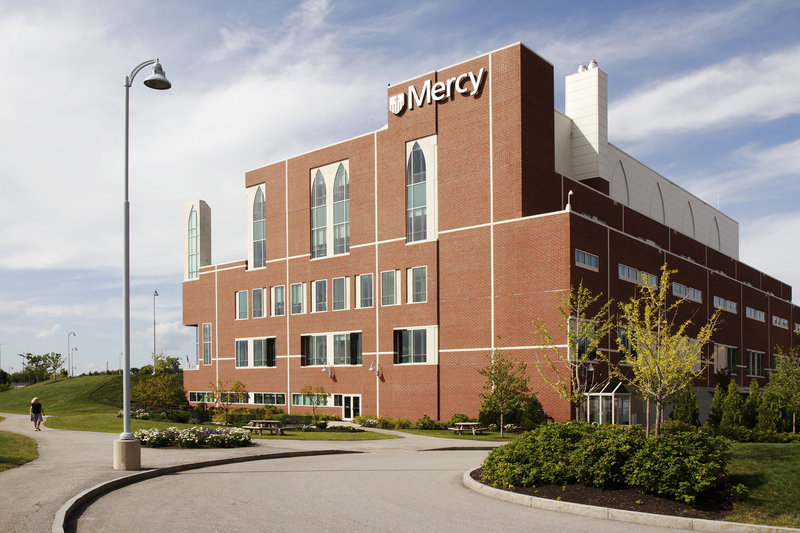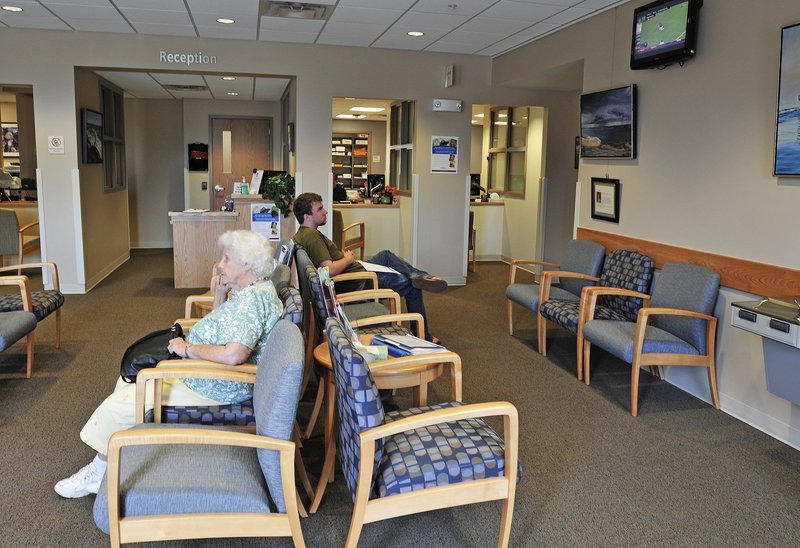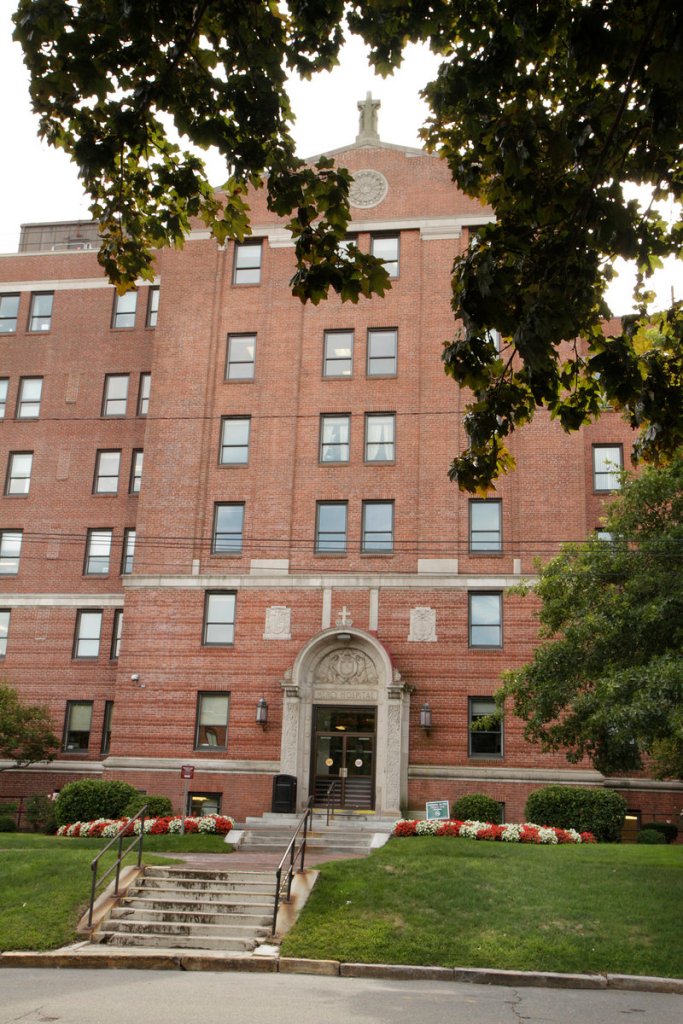PORTLAND — Mercy Health System of Maine may be sold to a Massachusetts hospital chain, which would become the first for-profit company to own a Maine hospital.
Terms of Mercy’s potential deal with Steward Health Care System LLC were not disclosed Monday. Mercy, which has 800 doctors and treats thousands of people every year at multiple facilities in southern Maine, said it intends to remain a Catholic institution.
Mercy has signed a letter of intent to negotiate the sale to Steward, which could take six months to complete. Steward intends to retain Mercy’s management team and 1,700 employees.
“This is very big news for Maine. It would be the first for-profit hospital in the state,” said Jeff Austin, a spokesman for the Maine Hospital Association.
Mercy Health System has two hospitals in Portland, nine primary care facilities in Greater Portland and a medical staff of more than 800.
It is part of Catholic Health East, a health system in 11 states from Maine to Florida.
Steward Health Care System operates 10 community hospitals with 2,700 physicians in Massachusetts, including six Catholic hospitals.
Mercy Health System started a strategic review about a year ago, considering the weak economy and pending health care reform. It picked Steward among numerous suitors because of its financial resources, its values and its willingness to allow Mercy to maintain its Catholic affiliation, said President and Chief Executive Officer Eileen Skinner.
“This was a proactive choice. We decided to do this, we didn’t have to do this. We’re hoping to do some really successful things together,” Skinner said.
Skinner, who earned more than $527,000 in 2010, said Mercy’s Catholic mission doesn’t conflict with the notion of a for-profit hospital.
“It’s a for-profit entity that provides health care. There are good for-profits and bad for-profits, just as there are good nonprofits and bad nonprofits. This is really about intent, not tax status,” Skinner said. “The things that are essential — our mission, our charity care, treating all patients with dignity — will not change.
“The Catholic identity won’t change. We’re not going to do anything we don’t do today,” Skinner said.
Steward is owned by Cerberus Capital Management, a private equity firm named for the mythological three-headed dog that guarded the gates of Hades. Cerberus bought Steward, then known as Caritas Christi Health Care, in 2010 for $830 million.
Steward’s deal with Mercy would be the latest in a spate of acquisitions of hospitals by private equity firms.
Bain Capital, co-founded by presumptive Republican presidential nominee Mitt Romney, and others bought HCA in 2006. HCA now owns 163 hospitals nationwide. The success of that deal sparked a wave of buyouts; there have been 35 acquisitions of hospitals or health care chains by private equity firms in the last 2½ years, according to The New York Times.
Although Mercy said its mission won’t change, some health care advocates were cautious Monday.
“This would be going from a system that doesn’t add a profit margin to one that does — that’s a change,” said Mitchell Stein, policy director with Consumers for Affordable Health Care, a Maine-based nonprofit advocacy organization. “We have to make sure this doesn’t impact patient services.”
Mary Bertell of Westbrook, a mammogram technologist on Mercy Hospital’s Fore River campus, said she and co-workers were told about the sale agreement during a staff meeting Monday morning and assured that it would not lead to layoffs or other changes.
“They said they did it because it’s a good company,” Bertell said.
She said she is hopeful about the sale because it could help the hospital complete its move from State Street in Portland’s West End to the new Fore River campus and bring stability after recent rounds of layoffs.
“We’ve been through enough layoffs,” Bertell said.
Bertell said she has worked for for-profit health care companies and she isn’t worried about the change.
“To me, it doesn’t make any difference if you are working for a for-profit or nonprofit,” she said. “We would give patients the same quality care … It would benefit the city, too, because now as a for-profit (the hospital) will pay taxes.”
Last year, Mercy’s hospitals spent about $12.8 million, 3.3 percent of its gross revenue, providing free care. Its charity care costs have more than doubled in the past five years. Mercy provided more free care as a percentage of its gross revenue than its peers in Greater Portland, according to a review by the Portland Press Herald.
Mercy said Steward has made nearly $600 million in capital investments in its hospitals in Massachusetts. As part of the deal, Steward would make a “significant investment” in Mercy’s facilities and programs, including VNA Home Health Hospice. The amount of the investment was not disclosed.
Steward’s move to buy Mercy is part of the company’s effort to expand beyond Massachusetts. It also has a tentative deal to acquire Landmark Medical Center of Woonsocket, R.I.
Steward is a taxable entity, so Mercy would pay applicable state and local taxes, including property taxes, in the communities where it operates. Portland officials said Monday that they could not estimate the potential tax impact.
Mercy has worked to expand its primary care and specialty practices and completed Phase I of its Fore River health care campus.
Skinner said an emphasis on preventive care and shifting more care to the home have helped to keep patients healthy but limited Mercy’s finances. Mercy’s revenue totaled $190.4 million in 2010, down from $195.6 in 2009.
“If you’re keeping people well, you’re not getting paid,” Skinner said.
Under Steward’s ownership structure, Mercy would get paid on a per member, per month basis — a “capitated system.” It would emphasize providing more care at home, more intense intervention for substance abuse, better transportation services and more primary care services, Skinner said.
She said it’s uncertain what would happen to the hospital on State Street. Mercy has been shifting acute-care services out of that hospital to its Fore River campus.
Bill Higgins of Standish said he hopes nothing about Mercy will change, but he’s not so sure.
He and his family have been going to Mercy Hospital for 50 years; four of his six children were born at the hospital on State Street. His wife was admitted Monday for surgery on a broken bone in her pelvis, he said.
“They’ve been super here, but like every other hospital they’ve been stressed,” Higgins said, and a sale to an out-of-state, for-profit company would probably bring change.
“If a company sells to another company, you know there are always changes. So we’ll just see what happens,” he said.
Federal and state regulatory steps must be taken before the sale can be finalized. The Maine Attorney General’s Office said it is too soon to determine whether it would have to weigh in on the transaction. It gets involved if a purchase is considered a conversion from a not-for-profit to a for-profit.
“We haven’t determined if it’s a conversion transaction,” said Brenda Kielty, special assistant to the attorney general. “It’s too soon to say or to comment on what our position would be.”
The state Department of Health and Human Services also would need to weigh in. It would have to review Mercy’s “certificate of need,” which is required for the expansion or development of health care services or certain projects by health care facilities.
Approval for the deal also would be needed from the Vatican.
Earlier this year, Mercy drew attention for its contract with a debt-collection agency that has used aggressive collection techniques elsewhere.
Mercy hired Accretive Health Inc., which was sued in January by the Minnesota Attorney General’s Office for allegedly violating patient-privacy and debt collection laws in a chain of hospitals in that state. Mercy said it would not tolerate any of those aggressive tactics at its facilities.
Andrew MacLean, who represents Maine physicians as a lawyer with the Maine Medical Association, said the sale would bring positive changes to the health care industry in southern Maine.
“If this is the route to financial stability for Mercy, that’s going to be a good thing for physicians and all of us as consumers,” he said. “A stronger Mercy in the ever-more-populated southern part of the state, and perhaps more competition, I think that’s going to be a good thing.”
MacLean acknowledged that the sale would introduce a new wrinkle by making Mercy Health System a for-profit operation.
“That’s something we’ll watch closely,” he said. “We have no preconceived notion or bias.”
— Staff Writer John Richardson contributed to this report.
Staff Writer Jessica Hall can be contacted at 791-6316 or at:
jhall@pressherald.com
Send questions/comments to the editors.





Comments are no longer available on this story